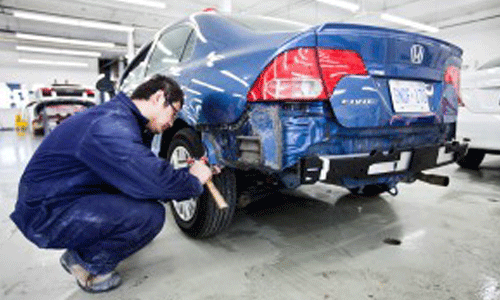Ann Arbor, Michigan — July 22, 2015 — NSF International has announced the launch of its Automotive Collision Repair Shop Certification Program, designed to verify a centre’s ability to conduct high quality repairs.
Collision repairers and industry experts worked alongside NSF International to develop requirements for the program, in accordance with American National Standards Institute (ANSI) procedures.
“There are 33,000 to 35,000 collision repair shops in the US today. With NSF International collision repair shop certification, qualifying shops now have a way to differentiate themselves from the competition in terms of providing higher quality, safer repairs and exceptional customer service,” says Fix Auto Highlands Ranch Second Generation Operator Dan Stander, one of the collision repair experts behind the development of the NSF International protocol on which the certification program is based.
NSF International certified collision centres will be required to meet state, federal and local collision repair shop regulations and undergo biannual audits to verify continued compliance with the program’s requirements, which include:
• Performing high-quality, consistent repairs
• Using and maintaining proper equipment for the job
• Having qualified and trained personnel
• Using quality parts for repairs
• Responding promptly to complaints and consumer feedback
• Utilizing modern computer estimation systems
• Providing excellent customer service
NSF International offers four types of automotive collision repair shop certification:
1. Cosmetic/non-structural repair: Covers repairs, refinishes and/or replacement of bolted on parts to restore a vehicle to its original state and shape.
2. Structural repair: Covers non-aluminum repairs that require welding, rivet bonding and/or measuring and pulling in order to restore a vehicle to its original state and shape.
3. Aluminum non-structural cosmetic repair: Covers cosmetic/non-structural repairs on a part comprised of aluminum.
4. Aluminum structural repair certification: Covers structural repair on a part comprised of aluminum.
Centres meeting all certification requirements are permitted to use the NSF International certification mark on their website and promotional materials indicating the appropriate certification type listed above. NSF’s online certification listings will feature all certified facilities, which will undergo ongoing quality systems inspections to maintain certification. The organization has entered into an agreement with AccuracyDriven4 to provide the required audit services.
“The collision industry has struggled for years to adopt a standard for providing safe and accurate repairs to the consumer,” says Douglas Irish, AccuracyDriven4 President and CEO. “It has been a long process and it makes sense for NSF International, a company recognized globally for testing and certification, to be the independent entity that brings collision repair certification to a reality. AccuracyDriven4 is pleased to be the exclusive provider of audit services for the NSF International Automotive Collision Repair Shop Certification Program.”
The NSF International Collision Repair Shop Certification Program joins NSF’s Automotive Collision Replacement Parts Certification, designed to certify that automotive aftermarket parts meet quality, safety and performance standards in terms of form, fit and function. The new program also complements the organization’s International’s Automotive Collision Parts Distributor Certification, developed to certify distributors selling aftermarket parts.
“Consumers now have access to collision parts and repairs that have been independently certified at the manufacturing, distribution and now the body shop repair level,” says Bob Frayer, Global Managing Director of Automotive Certification Programs at NSF International. “NSF International’s collision part replacement, distribution and body shop repair certification programs work together to provide customers peace of mind that each link in the collision part and repair supply chain is able to deliver the highest quality parts and service.”
To learn more, please visit nsf.org, or contact Bob Frayer at autocert@nsf.org.
Information on management systems registration can be found at nsf-isr.org, or by contacting Tony Giles at agiles@nsf.org.











































